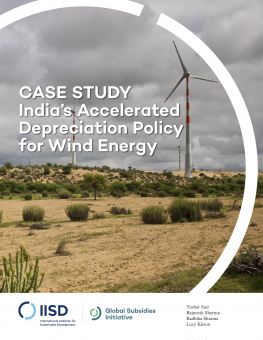
India's Accelerated Depreciation Policy for Wind Energy
This case study—one of a series of cautionary tales on renewable energy subsidies—examines how the policy of accelerated depreciation for wind power projects has affected the development of the wind power industry in India.
In recent decades, wind power in India been deployed at a tremendous rate, such that wind power projects now account for two thirds of total renewable energy generating capacity and almost one tenth of total installed generating capacity.
This case study examines one of the policies that is widely considered to be the primary driver behind this expansion—accelerated depreciation (AD) for wind power projects.
The case study reviews the modalities of the policy, focusing on how they have influenced the characteristics of India’s wind power industry. It considers not only the increase in wind power capacity and to what extent this can be attributed to the AD policy, but also how the policy has affected wind power generation and the development of the wind turbine industry in India. The analysis draws on research conducted to date on this and similar policies in other countries (notably the United States), as well as on a series of interviews with industry stakeholders.
Based on this analysis, the case study reflects on the positive and negative lessons that can be drawn from the AD policy and how these lessons could be incorporated into future policies in the sector, both in India and elsewhere.
You might also be interested in
Increased Support Needed to Achieve India's Clean Energy Goals
India is on track to achieve many of its 2030 clean energy goals but needs to step up government support measures to accelerate the deployment of offshore wind, electric vehicles, and green hydrogen, according to a new report.
India Faces Clean Energy Challenges as Energy Demand Soars and Global Fossil Fuel Subsidies Rise
New research finds the global energy crisis and increasing energy demand have pushed India's energy subsidies to a 9-year high.
G20 energy ministers call for cooperation on nuclear energy & low-emission hydrogen
The Group of 20 energy ministers' meeting concluded in Goa on July 22, 2023, with the final summary failing to include language on the phase-down of unabated fossil fuels.
Implementing Solar Irrigation Sustainably
This guidebook provides recommendations to state policy-makers on how they can implement solar irrigation models, particularly decentralized solar plants for irrigation under the PM-KUSUM scheme, effectively and sustainably.